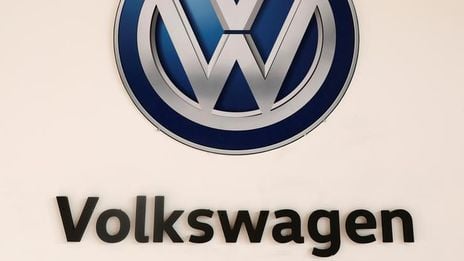Prosecutors in the German town of Braunschweig used a so-called administrative order to fine Volkswagen for oversight problems which allowed millions of polluting VW cars to hit the road.
The fine is one of the biggest ever penalties imposed by German authorities against a company.
It deals yet another blow to one of Germany's big industries which is struggling to recover from the fallout from the emissions cheating scandal that broke in Sept. 2015.
The 1 billion euro fine is not included in the 25.8 billion euros ($30 billion) that Europe's biggest carmaker has set aside to cover costs related to its admission that it cheated U.S. diesel emissions tests, and it will hit earnings, analysts at Evercore ISI said.
But shareholders should welcome the move since it marks an end to some of the criminal proceedings against the carmaker, they added.
However, that is not the end of VW's legal problems.
Prosecutors in the southern city of Munich said they too are examining whether to impose similar fines on VW's premium division Audi, for its role manipulating 6 and 8 cylinder diesel engines.
That would be in addition to Braunschweig's fine which sanctioned violations tied to 4-cylinder diesel engines.
Stuttgart prosecutors, who have launched a probe against employees at Daimler, Porsche, which is another part of the Volkswagen group, and auto supplier Bosch said they too may consider the use of an administrative order.
"In all these proceedings it is possible that a regulatory offense procedure will be carried out, we are still evaluating this possibility," a spokesman for the Stuttgart prosecutor's office said on Thursday.
TIMING ISSUE
Prosecutors in Braunschweig are also investigating Volkswagen executives including chairman Hans Dieter Poetsch and chief executive Herbert Diess to see if they informed investors in a timely fashion about the scale of potential fines faced by the carmaker for cheating U.S. emissions tests.
The company denies any wrongdoing by its executives.
Braunschweig said it may rule on the matter in the coming months. The town is the main legal jurisdiction covering VW's headquarters in the German town of Wolfsburg.
"On market manipulation, it is possible that there will be a decision this year. A decision does not necessarily mean bringing charges, it could mean closing the proceedings," Braunschweig prosecutor Klaus Ziehe said at a news conference.
In a filing submitted to a Braunschweig court on Feb. 28, Volkswagen argued it did not violate corporate disclosure rules because it did not understand the scope of potential fines and claims faced by the company.
Four days before U.S. regulators blew the whistle on Volkswagen, Poetsch - the company's chief financial officer at the time - saw the potential financial risk from emissions violations at 150 million euros, the court filing shows.
U.S. authorities disclosed Volkswagen's systematic emissions cheating on Sept. 18, 2015, sparking the biggest business scandal in the company's history and triggering a crackdown on emissions across the industry.
Volkswagen shares were up 2.5 percent by 1400 GMT, outperforming the blue-chip DAX index <.GDAXI> and the Stoxx 600 Autos index.
(Reporting by Ilona Wissenbach in Frankfurt, Joern Poltz in Munich, Jan Schwartz in Hamburg and Andreas Cremer in Braunschweig; Writing by Edward Taylor; Editing by Mark Potter and Keith Weir)






